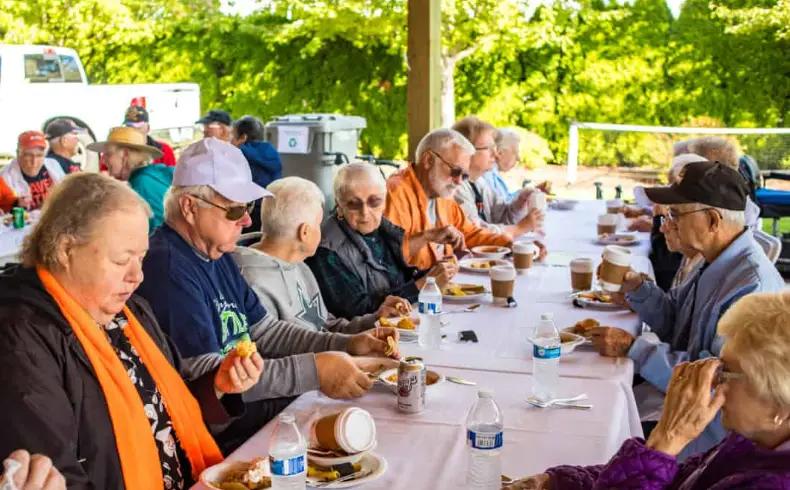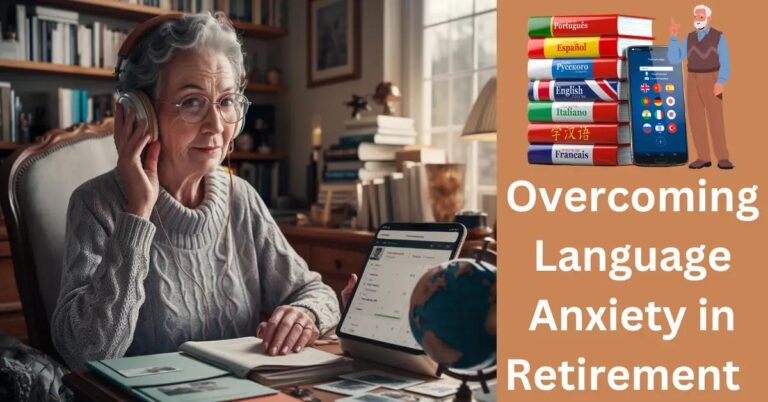TL;DR:
- Retiree destination choices are influenced by climate, healthcare, cost of living, language, and safety.
- Top retirement spots include Spain, Portugal (excellent healthcare), Costa Rica, Panama (friendly locals), and Malaysia (low cost of living).
- Large expat communities help with social integration.
- Important cultural differences include norms on punctuality, personal space, communication styles, and social etiquette.
- Effective language learning methods: classes, apps, daily practice, labeling items, watching local TV, reading simple books.
- Making friends abroad: join social clubs, expat communities, attend local events, volunteer, use social media.
- Addressing cultural shock: understand its stages, learn customs, maintain mental health, use effective communication.
- Benefits of participating in local festivals: build friendships, show respect for culture, create lasting memories.
- Volunteering offers purpose, better language skills, and cultural integration.
- Staying connected: use video calls, social media, expat forums, and balance life abroad with connections back home.
Retiring abroad can be a thrilling adventure, but cultural integration is key to enjoying your new life. In “Cultural Integration for Retirees Overseas: How to Start?”, I will guide you through adapting to your new surroundings. From choosing the right destination to learning local customs and making friends, this post covers it all. Dive in and discover how to make your overseas retirement a seamless and enriching experience.
How Do Retirees Choose the Best Expat Retirement Destination?
Choosing the perfect retirement spot overseas is key. Many retirees start by making a list of needs. Think about climate, healthcare, cost of living, language, and safety. For instance, if you love warm weather, you might want to look at places like Costa Rica or Mexico. Also, great healthcare is essential. Many choose Portugal or Spain for their top-notch medical services.
Looking into popular retirement destinations is helpful. Panama often tops the list for retirees. It’s famous for its friendly locals and good healthcare. Malaysia is another favorite, known for its low cost of living. These places cater to expats with communities and services in English.
It’s smart to also think about social settings. Will you be happy with the local culture and social norms? Think about how easy it will be to meet new friends. Some retirees pick countries with big expat communities to help ease this transition.
When looking at the best countries for retiring abroad in 2023, Spain and Portugal stand out. They are known for their lovely weather, excellent healthcare, and friendly people. Costa Rica is also on top, offering natural beauty and a relaxed lifestyle. Each place has unique benefits.
International retirement migration example: Many retirees move from the U.S. to Mexico. Moving to a nearby country with a similar time zone keeps them close to home. Mexico offers affordable living and a warm climate. The expat communities provide a sense of belonging.
Research helps a lot. Look at forums and talk to other retirees about their experiences. Read guides and articles to gather as much info as possible.
To find the right place for you, visit in person if possible. Spend a few weeks there. Check out the local amenities, socialize, and see how it feels to live there. This firsthand experience can make a huge difference.
Overall, consider your priorities, research well, and visit before making a decision. Choose a place that makes you happy and feels safe. Keep an open mind and be ready for a new adventure.
What Are the Key Cultural Differences Retirees Should Understand?
Major cultural differences between various countries
Cultural norms vary greatly. In Japan, punctuality shows respect, while in Spain, being late is accepted. In America, people appreciate personal space, but in India, closeness is normal. In Italy, meals last hours; in the UK, they are quick. These are just glimpses of cultural differences you might face overseas.
Tips for adapting to new cultural norms and customs
Start by observing. Watch how locals interact and dress. Mimic their mannerisms. If unsure, ask directly. Locals usually appreciate your effort to understand. Learn a few phrases in the local language. A simple “please” or “thank you” goes a long way. Also, read up on the customs before moving.
Understanding social etiquette and communication styles
Social etiquette is key. In Japan, bowing shows respect. In France, a firm handshake or cheek kisses are normal. Knowing these can prevent awkward moments. Communication styles also differ. In some cultures, directness is valued. In others, it’s seen as rude. Pay close attention to body language too. It often tells more than words.
Overcoming cultural barriers in everyday life
Daily tasks can highlight cultural barriers. Shopping at local markets might be different. Negotiating prices has different rules. For example, in some Asian countries, bargaining is expected. Meanwhile, in Western countries, prices are fixed. Engaging with locals helps. Join community groups or activities. This guide on cultural integration can offer detailed steps to ease your transition.
Understanding these differences helps you integrate better. Making an effort shows respect and builds trust. With time, you’ll feel more at home in your new country. Despite initial challenges, adapting to a new culture can be rewarding. The experience often broadens your world view and brings you closer to the local community.
How Can Retirees Learn a New Language?
Learning a new language is key to feeling at home in your new country. Knowing the local language helps you make friends and feel less isolated. Even simple words can break down barriers and build connections with locals.
Best Language Learning Methods for Retirees
Start with classes. Foreign language classes can give you structure. Many places offer classes made for adults. These classes move at a pace that’s good for retirees. I found the local community center in Paris an excellent place to start. You can also try learning apps like Duolingo or Babbel. They make learning fun and let you go at your own speed.
Benefits of Taking Local Language Classes
Local classes have big perks. Firstly, they help you understand common phrases you will use each day. Secondly, they offer a way to meet people. I met many friends while taking classes in Lisbon. Lastly, these classes often have cultural tips embedded in the lessons. These tips are precious and give insights into how people live and think.
Tips for Practicing the Local Language Daily
Practice every day. Speak with shopkeepers, neighbors, and others. This is called local language practice. It’s okay to make mistakes; it’s part of learning. Here are some easy tips:
- Use Labeling: Put labels on items in your home with their names in the local language.
- Watch Local TV: Programs for kids are good as they use simple words. News shows are also helpful.
- Read Simple Books: Children’s books are great. They use simple sentences and common words.
Always keep a notebook handy. Write down new words and phrases you hear. Review them often. Lastly, find a language partner. This can be another retiree or a local who wants to learn English. It’s a win-win.
Embrace your new home and its language. It opens doors and hearts.
What Are Effective Strategies for Making Friends Abroad?
Making friends abroad can be challenging yet rewarding. Friendships give retirees overseas a sense of community, and they help with social integration. The key is knowing where to start and being open to new opportunities.
Join Local Social Clubs and Expat Communities
One effective strategy is to join local social clubs. Social clubs for expats can be wonderful places to meet others who share your interests. Many countries have formal expat communities where you can find events and gatherings. By participating, you’ll meet people who understand your experiences and challenges.
Different areas may have clubs for various activities like cooking, hiking, and art. Check local libraries or community centers for listings. Sometimes cafes or bookstores have notice boards with club information. This makes it easier to find a group that fits your hobbies.
Tips for Making New Friends and Social Networking
To make new friends, start by learning a few phrases in the local language. Even simple words show your effort to connect and respect the culture. A warm smile and friendly attitude go a long way.
Attend local events and festivals. These are fun and help you meet locals in a relaxed setting. Don’t hesitate to start conversations; ask questions about local customs or the event itself. People often appreciate genuine interest in their culture.
Volunteering is another great way to meet people while giving back to the community. Local schools, shelters, and non-profits often need volunteers. This not only builds connections but also gives you a sense of purpose.
Networking isn’t just for business; social networking can be a powerful tool too. Use social media platforms dedicated to expats. You can find facebook groups or forums where retirees share advice and organize meet-ups.
Success Stories from Retirees Who Have Built Social Networks Abroad
For inspiration, consider stories from other retirees. Jane moved to Spain and joined a local book club. Through it, she found friends who introduced her to other local events. Her experience highlights the importance of clubs in making friends.
Similarly, Tom moved to Thailand and started volunteering at a local animal shelter. He quickly made friends with fellow volunteers. These friendships turned into regular social gatherings.
Success stories show that making friends abroad is possible and fulfilling. All it takes is initiative and openness to new experiences.
How Do Retirees Navigate Cultural Shock?
Understanding the stages of cultural shock
Cultural shock happens in stages. The first stage is the honeymoon period. Everything feels new and exciting at the start. You feel like you’re on vacation. Next comes the frustration stage. You might get annoyed at little things. You miss familiar foods or ways of doing things. Then comes the adjustment stage. You start to understand how things work. Normal life begins to return. Finally, you reach acceptance. You feel comfortable and at home. Knowing these stages helps manage your expectations.
Strategies for coping with cultural adjustment
To deal with cultural shock, start by learning local customs. Be curious. Ask questions. Try new foods and join local events. If something bothers you, find a local friend to talk it over. Use your hobbies to connect with people. Do you like gardening or cooking? Find a group or class. Stay flexible and open-minded. Understanding and patience go a long way. Research has shown that these strategies can ease your transition.
Importance of maintaining mental health and seeking support
Your mental health is crucial. Moving can be stressful. Connect with others who have gone through it. Joining expat groups helps a lot. Sometimes, just knowing you are not alone makes a difference. Counseling can also be a good idea. Some therapists specialize in helping expats. Keeping a journal also helps. Write down your feelings. Reflect on your experiences. Exercise can lift your mood too. Regular walks or yoga can make you feel better.
Tips for effective cross-cultural communication
Good communication is vital. Learn key phrases in the local language. Even a simple “hello” or “thank you” goes a long way. Mind your body language. Smiles and eye contact show respect. Don’t worry about making mistakes. Locals often appreciate your effort. Speak slowly and clearly. Use simple words. If you don’t understand someone, don’t pretend you do. Ask for clarification. Learning the cultural norms of greeting and small talk is helpful.
Navigating cultural shock takes effort, but these tips make it smoother. Stay positive and resourceful. You’ll adjust and thrive.
How Can Retirees Participate in Local Traditions and Festivals?
Overview of Important Local Traditions and Festivals
Local traditions overseas offer a rich glimpse into a new culture. Each country has unique celebrations and rituals. For example, in Spain, the La Tomatina festival is a famous tomato-throwing event. In Japan, you might find yourself admiring cherry blossoms during Hanami. Learning about these customs helps you feel more connected to locals.
Benefits of Participating in Cultural Events
Joining in cultural events has many benefits. First and foremost, it helps you meet new people and make friends. When you join in, locals see you as someone who respects their culture. Plus, these events can be lots of fun and leave great memories. They are a good way to discover the history and soul of your new home.
Ways to Learn About and Respect Local History
Before diving into festivals and holidays abroad, try to learn about the local history. Visit museums, read books, or join a local history group. Ask locals to explain the stories behind their traditions. Showing respect for their history and customs builds trust and goodwill.
Personal Accounts of Retirees Engaging in Local Traditions
I’ve talked with many retirees who shared positive experiences. One couple I know moved to Mexico and celebrated Día de los Muertos for the first time. They prepared an altar and joined a local parade. They said it made them feel part of the community. Another retiree in Italy took part in grape harvesting, which she found enhancing. Activities like these made their stays more enjoyable and meaningful.
Participating in local traditions overseas and cultural events participation makes life abroad vibrant. Respecting and learning local history reveals deep cultural roots. Engaging sincerely opens doors and enriches your retirement life.
What Are the Top Volunteer Opportunities for Retirees Overseas?
Volunteering abroad can make you feel at home in a new country. As an expat retiree, you can find various fulfilling volunteer roles. You could help with teaching English, support local schools, or join environmental projects. Some retirees even engage in healthcare work.
Volunteering has many benefits. It helps you get to know the local culture quickly. You meet new people, both locals and other expats. This improves your language skills and local knowledge. Plus, it gives you a sense of purpose and belonging.
Finding the right volunteer program takes some steps. First, decide what type of work interests you. Look for organizations that have a good reputation. Websites like Volunteer World can help find programs. Contact the organizations to ask about their needs and expectations. Make sure your skills match what they need.
Retirees have some amazing stories about volunteering abroad. Take Marie, a retired nurse who moved to Costa Rica. She started volunteering at a local clinic. Marie learned Spanish faster because she spoke with patients every day. She also formed deep friendships with her colleagues.
Or look at John, who moved to Thailand and taught English. He joined a school and helped children improve their language skills. John not only taught them but also learned about their customs and daily lives. His experience was enriching and gave him a deeper understanding of Thai culture.
Share your talents with others and enrich your own life by volunteering. Whether you choose to teach, help in healthcare, or work on environmental projects, you’ll find many doors open. You might even discover parts of yourself you never knew.
By investing your time and energy, you can turn a foreign land into a home. Remember, the first step is always to reach out and get involved. Volunteering isn’t just work; it’s a way to connect, learn, and grow.
How Can Retirees Stay Connected to Home?
Staying connected to family and friends is crucial for retirees overseas. It provides emotional support, keeps you updated with home events, and eases the transition into a new culture.
Importance of Staying in Touch with Family and Friends
Staying in touch offers emotional support and combats feelings of isolation. By keeping regular contact with your loved ones, you can share your experiences and stay involved with life back home. This shared connection helps in managing the homesickness that many retirees face when living abroad.
Best Technologies for Maintaining Communication
The best way to stay connected is through technology. There are several tools like Skype, Zoom, and WhatsApp that make video calls easy and affordable. Video calls are a great way to see familiar faces, making conversations feel more personal. For quick updates or sharing photos, social media platforms like Facebook and Instagram work wonders.
For more extensive discussions involving multiple family members, consider creating a family chat group on WhatsApp or Messenger. These platforms provide instant messaging, voice calls, and file-sharing options, making it simple to stay in contact with everyone back home.
Utilizing Expat Forums and Blogs for Support
Expat forums and blogs are great for finding support and advice from fellow expats. Websites like ExpatForum and Internations offer community-driven tips and insights that can help you adapt to your new culture while maintaining ties to home. You can read stories, ask questions, and even find new friends who are going through the same experiences.
Balancing Life Abroad with Connections Back Home
Balancing your new life abroad with connections to home is essential. Schedule regular times for video calls and plan visits back home if possible. Engage in local activities and, at the same time, ensure you have time reserved for connecting with family and friends. This blend helps you immerse in your new environment while feeling anchored to home.
Maintaining this balance is key to enjoying your retirement abroad. It nurtures your new life abroad while cherishing relationships back home, ensuring a fulfilling and integrated experience. For more detailed information and hosting platforms, you can explore communication tools for expats online.
Conclusion
Choosing the perfect expat retirement destination involves analyzing options, understanding culture, and staying connected to home. Adapt to new customs, learn the local language, and make friends to feel more at home. Embrace local traditions and volunteer to give back. Use technology to maintain ties with loved ones. This journey can be challenging, but with the right strategies, it can be incredibly rewarding.







